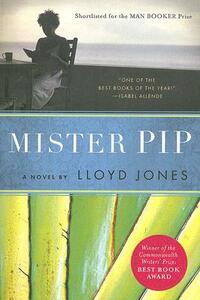Take a photo of a barcode or cover
A coming-of-age different from what I’m used to. Talks about the power of stories. Rife with emotions and lessons. Something to pick up when I’m feeling lost. Haven’t been able to slip into someone else’s skin that long for a long time.
4 stars because the pacing in the middle was a bit slow.
4 stars because the pacing in the middle was a bit slow.
I hate this book. Hate it. I was so disappointed.
Okay. I picked up this book because I read on Hugh Laurie's IMDb page that it was a movie, and then saw it was a Movie of the Book. Yes, a fangirly moment, I freely admit it. But after I bought it, I started to get really excited about it for the book itself, and at first it really seemed to deliver. I really liked Mr Watts as described by our heroine, Matilda. Matilda was a little less likable, but I could handle it.
But then Matilda turns out to be a coward, so then you don't like her anymore. And then Mr Watts is shot, chopped up and fed to the pigs, in one of the most unnecessarily gruesome deaths I've ever read, shortly followed by Matilda's mother, who dies in the exact same way, except we're left to assume that she wasn't shot first, as Matilda doesn't record hearing a gunshot. And a few other people die horribly, too. Including a little boy.
And then the author betrays us completely, by revealing to us that Mr Watts wasn't the person we'd supposed him to be at all. Worst of all, after all the suffering, I don't feel like I learned anything at all. Maybe I'm just a moron, but I didn't see a point to any of it.
This is a horrible, horrible book and I don't recommend it to anyone. I won't be seeing the movie, either.
Okay. I picked up this book because I read on Hugh Laurie's IMDb page that it was a movie, and then saw it was a Movie of the Book. Yes, a fangirly moment, I freely admit it. But after I bought it, I started to get really excited about it for the book itself, and at first it really seemed to deliver. I really liked Mr Watts as described by our heroine, Matilda. Matilda was a little less likable, but I could handle it.
But then Matilda turns out to be a coward, so then you don't like her anymore. And then Mr Watts is shot, chopped up and fed to the pigs, in one of the most unnecessarily gruesome deaths I've ever read, shortly followed by Matilda's mother, who dies in the exact same way, except we're left to assume that she wasn't shot first, as Matilda doesn't record hearing a gunshot. And a few other people die horribly, too. Including a little boy.
And then the author betrays us completely, by revealing to us that Mr Watts wasn't the person we'd supposed him to be at all. Worst of all, after all the suffering, I don't feel like I learned anything at all. Maybe I'm just a moron, but I didn't see a point to any of it.
This is a horrible, horrible book and I don't recommend it to anyone. I won't be seeing the movie, either.
Matilda is a young teenage girl growing up during the Bougainville Civil War. All of the white people left before the blockade was put down, except Mr. Watts, who decides to stay for reasons unknown to everyone else. Mr. Watts decides that the island kids need to continue their education, but he's not really much of a teacher so he reads them a chapter of Great Expectations every day, invites the kids' family members in to share whatever they know, and kind of muddles through subjects like math the best he can.
I had an uncomfortable relationship with this book through the first half, as I didn't really like the pretense that a white dude is needed to change the kids life by teaching them about Victorian England and telling them that their culture is worth paying attention to. But the second half of the story totally clears this up. I don't want to spoil anything, but the last part of the book makes everything worthwhile, in my opinion.
I had an uncomfortable relationship with this book through the first half, as I didn't really like the pretense that a white dude is needed to change the kids life by teaching them about Victorian England and telling them that their culture is worth paying attention to. But the second half of the story totally clears this up. I don't want to spoil anything, but the last part of the book makes everything worthwhile, in my opinion.
Sometimes I think that I live in a bubble. I had never heard of this book, which was shortlisted for the Man Booker Prize, until Boo loaned it to me. Thanks, Boo. I really enjoyed it. This coming of age story takes place on an unnamed tropical island in the early 1990's. A civil war is raging on the island and the villagers on the island are trapped between the rebels and invading "redskin" soldiers. All of the whites have left the island except for Mr. Watts and he volunteers to teach the 20 children in the village between the ages of 7 and 15. Having no teaching experience, he reads Great Expectations to the children and the story, in large part, revolves around the themes of literature as both an escape and as a transforming force. The themes of estrangement and personal growth and change in Great Expectations mirrors the changes that take place in Matilda's life (the narrator) over a 21 month period from age 13 to age 15. This is a book that I was planning to read a chapter or two from before I went to bed and, instead, I read it in one sitting.
This was a slow start but once I got into it I was gripped. An interesting mixture of emotions and events. Parts nearer the end are so traumatic.
An astonishing story about so many things: maternal love, guilt, race, imagination, politics and the power of books. Wow, this was good. I was not totally convinced that the voice was really that of a young woman, but otherwise a powerful, compelling novel.
I just couldn't get into this. I needed to know more about the background of the area before starting, I think. I also haven't read Great Expectations so that might be part of the problem. I loved the main character though.
I also was NOT expecting the brutally violent turn. I don't know why I didn't, but I didn't so it was a tough turn
I also was NOT expecting the brutally violent turn. I don't know why I didn't, but I didn't so it was a tough turn
This was a strange little book, which has any number of elements which would normally combine to irk me a great deal: a middle-aged white man writing in the voice of a teenage girl of colour from a remote island in Papua New Guinea; a style so simple and staccato that it seemed almost tonally at odds with the extreme violence which is described towards the end; some rather smug, back-slapping, Kipling-esque undercurrents; a denouement which is described too quickly, falling rather flat and continuing on for a good forty pages longer than it needed to.
And yet almost despite myself, I found myself really enjoying Mister Pip. Jones has something wonderful to say about the power of the imagination, of shared imagination and emotion, which pulls the whole novella together and makes it work. It makes it entirely believable that a barely literate young woman would find a connection with a fictional character from a book set a century ago and thousands of miles away—and not just believable, but compelling.
And yet almost despite myself, I found myself really enjoying Mister Pip. Jones has something wonderful to say about the power of the imagination, of shared imagination and emotion, which pulls the whole novella together and makes it work. It makes it entirely believable that a barely literate young woman would find a connection with a fictional character from a book set a century ago and thousands of miles away—and not just believable, but compelling.
challenging
dark
emotional
hopeful
reflective
sad
tense
medium-paced
Plot or Character Driven:
A mix
Strong character development:
Yes
Loveable characters:
Complicated
Diverse cast of characters:
Yes
Flaws of characters a main focus:
Yes
dark
emotional
hopeful
fast-paced
Plot or Character Driven:
Character
Strong character development:
Yes
Loveable characters:
Yes
Diverse cast of characters:
Yes
Flaws of characters a main focus:
Yes




